It was another day of fieldwork; the project officer arrived at Amach health centre IV in Lira district, Northern Uganda at 9:15am and was welcomed by the security guard. No health worker had started working yet. He found 15 patients seated waiting for health service. By 10:20am 78 patients had lined up. Patients could not hide their disappointments on how they felt about the delay in accessing health service.
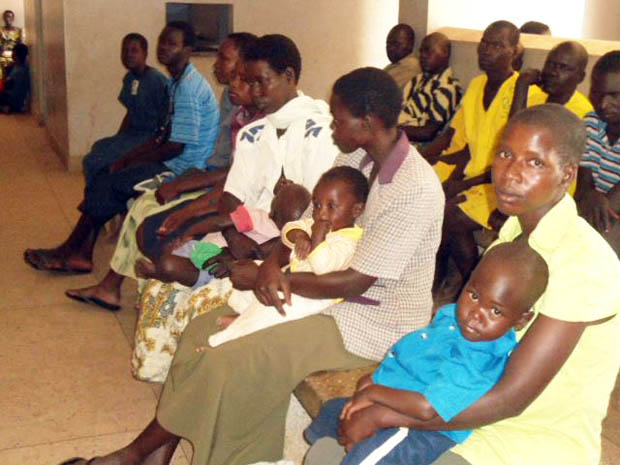
Patients waiting to be served by health workers. Most of the patients are women and children. Most men only visit health centres when they are personally sick but rarely take their children or spouse for medical care.
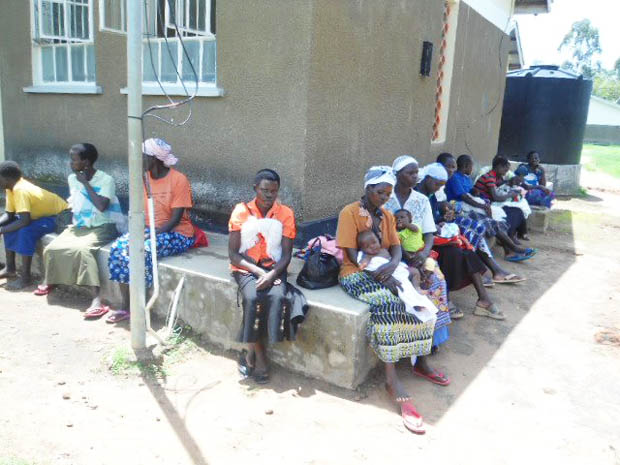
These women reported for immunization at 10am and waited up to 1:30pm for treatments to start. It is important to support women in accessing health services and also ensuring the health centres effectively execute their duties to enable them to attend to their many other responsibilities.

A young girl sitting with her mother as they wait to be attended to at Barr Health Centre III, Lira district (Northern Uganda). The health users do not understand their rights, and even if they did, they had no avenue of reporting, demanding and ensuring that delay in health services in their health centre is dealt with.
After nearly five years of insurgencies in Northern Uganda, access to healthcare is patchy. The sector is generally understaffed and even those employed remain absent from work while still being paid. Our chapter in Uganda is running a project in the Oyam and Lira district of Northern Uganda to stop health workers’ absenteeism. From April 2012 on Transparency International Uganda (TIU) is empowering communities to monitor and improve health service delivery by providing them with a toll free hotline to report on irregularities. This is done in cooperation with the Swedish Program for ICTs in Developing Regions (SPIDER).
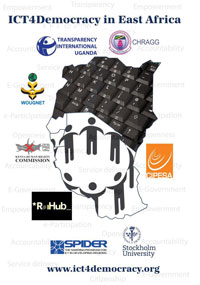 TIU is a member of the ICT for Democracy Network in East Africa which promotes social accountability and transparency through the use of ICTs. The network currently has 8 major members. Within the network there are three organizations (TIU, WOUGNET & CIPESA) from Uganda, two from Kenya (R iHub and Kenya Human Rights Commission), one from Tanzania (CHRAGG) and two from Sweden.
TIU is a member of the ICT for Democracy Network in East Africa which promotes social accountability and transparency through the use of ICTs. The network currently has 8 major members. Within the network there are three organizations (TIU, WOUGNET & CIPESA) from Uganda, two from Kenya (R iHub and Kenya Human Rights Commission), one from Tanzania (CHRAGG) and two from Sweden.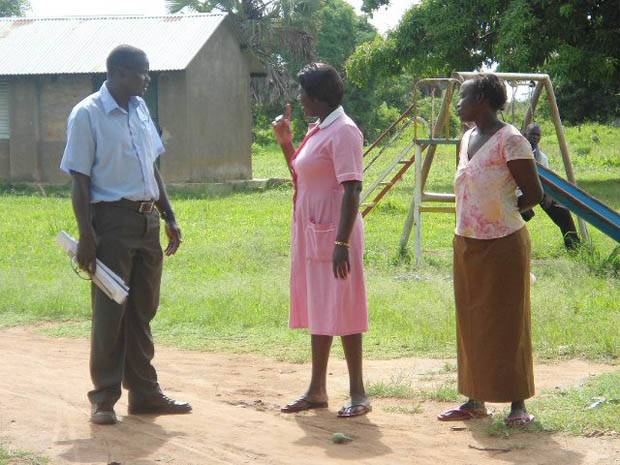
TIU project staff together with health workers at Amach health centre IV. By 10:00am these health workers had not yet commenced attending to health users. Health workers were briefed about the need to report on duty by 8:00am with or without patients, work together as a team and improve service delivery. By actively involving the health centre in-charge and health workers, the following day the health centre opened on time with early commence of patient treatment.
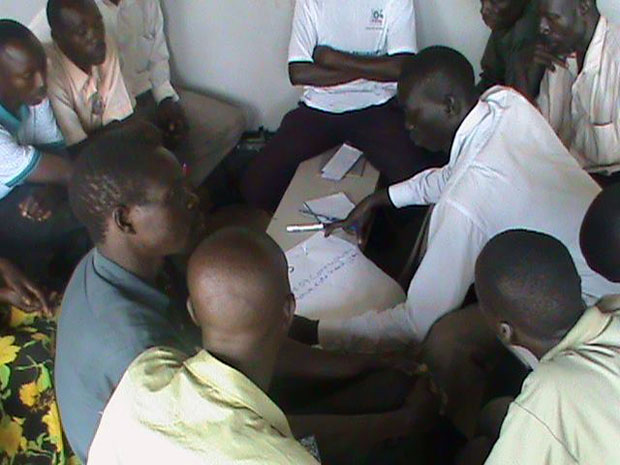
Voluntary Accountability Committees are tasked to monitor health service delivery in their respective community health centres, ensuring that health works report on time for duty and are not absent from duty. The above photo shows participants at Loro sub county discussing and coming up with forms of corruption and their causes in group work.
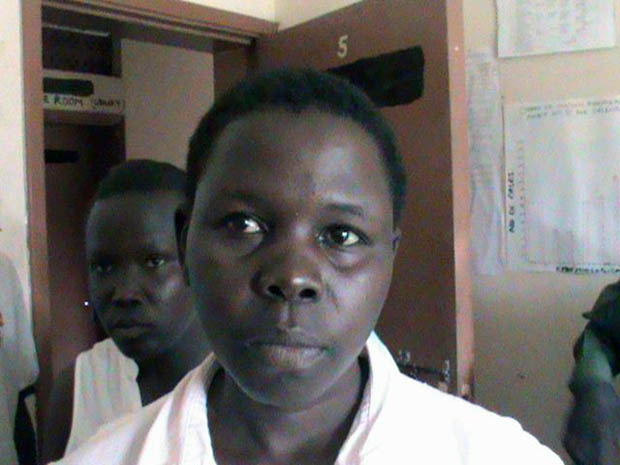
Chekweri Benna and Lamwaka Sunday are the only midwives at Amach health centre IV maternity ward. They are overwhelmed with work: Benna was said to have successfully served 27 mothers who had normal delivery in one week. Each week they register a rate of 10 -15 normal child deliveries, 10-13 cases of pregnant mothers’ malaria cases, abortion prevalence is seen at a rate of 3 to 10 within a given week.
TIU believes in working together with women, involving them in community development activities and being their voice at an advocacy level. Women are active and passionate in implementing community programs; they are concerned with the need for improvement of health care service delivery because they interface more with health challenges.
ICTs are viewed as a luxury reserved for the educated and wealthy which can mainly be accessed by people living in urban areas. This view is especially true for women who are often restricted to the domestic sphere which limits their access to training of relevance to them. One of TIU’s partners, Women of Uganda Network (WOUGNET), ran awareness-raising workshops under the SPIDER project on good governance and effective services delivery, as well as ICT capacity-building workshops in the Kole and Apac districts in December 2011. The purpose of these workshops was to equip rural women and men to use computers, the internet, mobile phones, radios, digital cameras, and print media to amplify their voices on issues of bad governance and poor service delivery in their different parishes so that the duty bearers are forced to respond appropriately.
TIU will provide women and men with a tool free call centre hotline to always report irregularities. The technology will be handled and managed directly by TIU. Telephone calls will be recorded and replayed to generate reports which are then shared with partners and the government (district health office) to demand for positive changes tailored towards improving health service delivery.
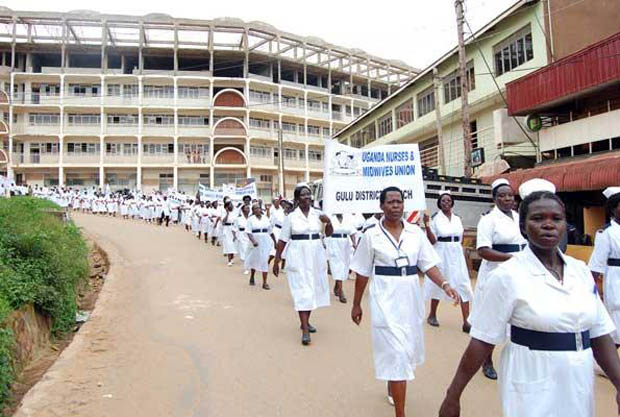
Nurses and midwives have asked the government to increase their pay and provide accommodation in a bid to improve their welfare. Speaking at the national celebrations for International Nurses Day in Mbarara District, the medics said the majority works 24 hours a day, every year without leave because of the heavy workload due to low levels of staffing.
See more photos here















 Connect with us on Facebook
Connect with us on Facebook Follow us on Twitter
Follow us on Twitter